The question of what constitutes the best hunting dog breed is subjective, varying from person to person. For many, it might be the sight of a pointer darting across a field, a Labrador retriever leaping after a duck, or a springer spaniel snatching a pheasant. The harmonious sound of a pack of blueticks on the trail at night also holds a special place. Hunting with dogs forms a partnership that has evolved over tens of thousands of years, benefiting both humans and canines. Some theories suggest that the hunting skills of these dogs even facilitated intellectual growth in our ancestors by freeing up brain capacity.
Dogs have an exceptional ability to interpret human body language and subtle cues. This is evident to anyone who has tried to sneak past their dog with a shotgun in hand.
Ultimately, dogs love to hunt and live for it as much as, or even more than, we do. We rely on their skills, admire their courage, and are inspired by their passion. Here’s a tribute to some of the best hunting dog breeds available.
Best Hunting Dog Breeds
- Labrador Retriever
- Brittany
- English Setter
- American Foxhound
- Treeing Walker
- Beagle
- German Wirehaired Pointer
- Mountain Cur
- Boykin Spaniel
- Golden Retriever
- Irish Setter
- Bluetick Hound
- English Pointer
- English Springer Spaniel
- Chesapeake Bay Retriever
- American Pit Bull
- Cocker Spaniel
- German Shorthaired Pointer
- Redbone Hound
- Jack Russell Terrier
- Plott Hound
1. Labrador Retriever
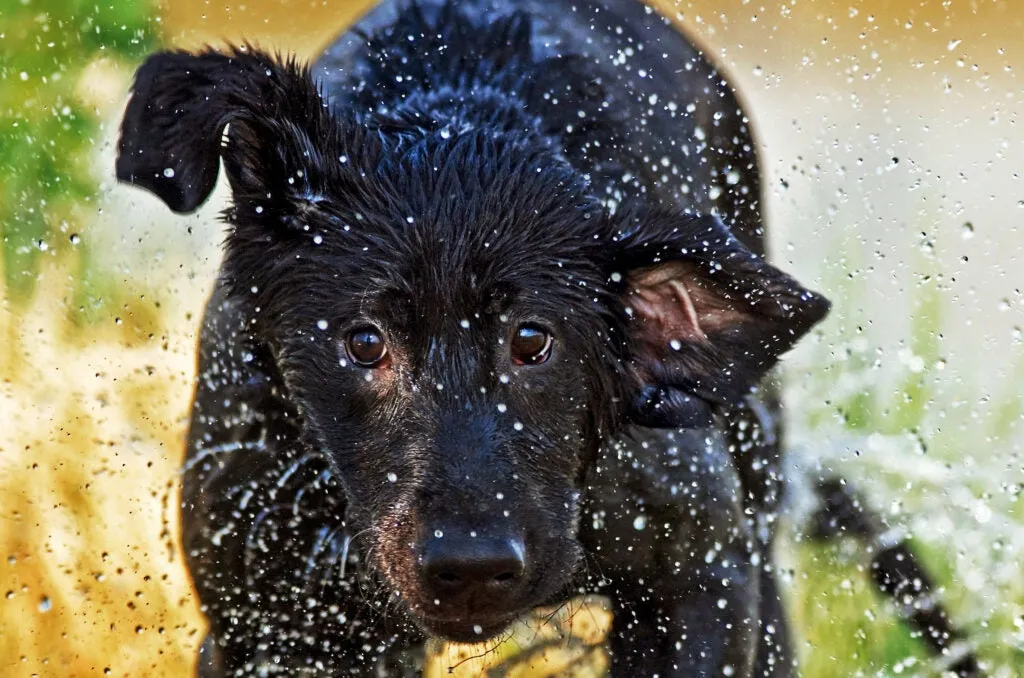 Labrador retriever runs through water on a hunt.
Labrador retriever runs through water on a hunt.
A versatile and popular hunting dog, the Labrador Retriever is seen here running through water during a hunt.
The Labrador Retriever is a highly versatile breed. A hunter appreciates a Lab with a bird in its mouth, covered in duckweed and mud. The sight of a Lab diving for a crippled bird, tirelessly pursuing it, is especially endearing. Despite their origin in Newfoundland, where they were bred from small water dogs and giant Newfoundlands, they are now known as Labrador Retrievers thanks to the Earl of Malmesbury.
Labs are excellent at waterfowl hunting, positioning themselves on the edge of water, ready to retrieve birds, even in cold and challenging conditions. They are always ready to hunt.
2. Brittany
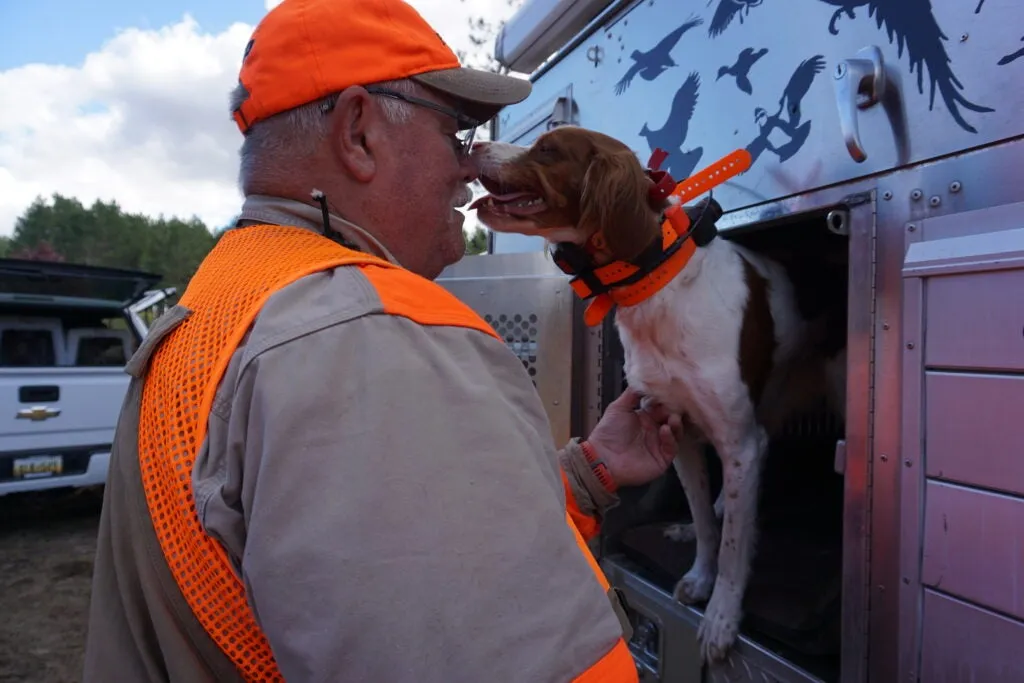 Brittany gets read to go on a grouse hunt.
Brittany gets read to go on a grouse hunt.
A Brittany hunting dog and its owner pausing for a moment before starting a grouse hunt.
Brittanys are intelligent and versatile hunting dogs, suitable for both home life and weekend hunts. They are compact, easy to transport, and perform as well as larger breeds. A well-trained Brittany is a joy to hunt with, pointing and retrieving birds with precision and satisfying the hunter.
3. English Setter
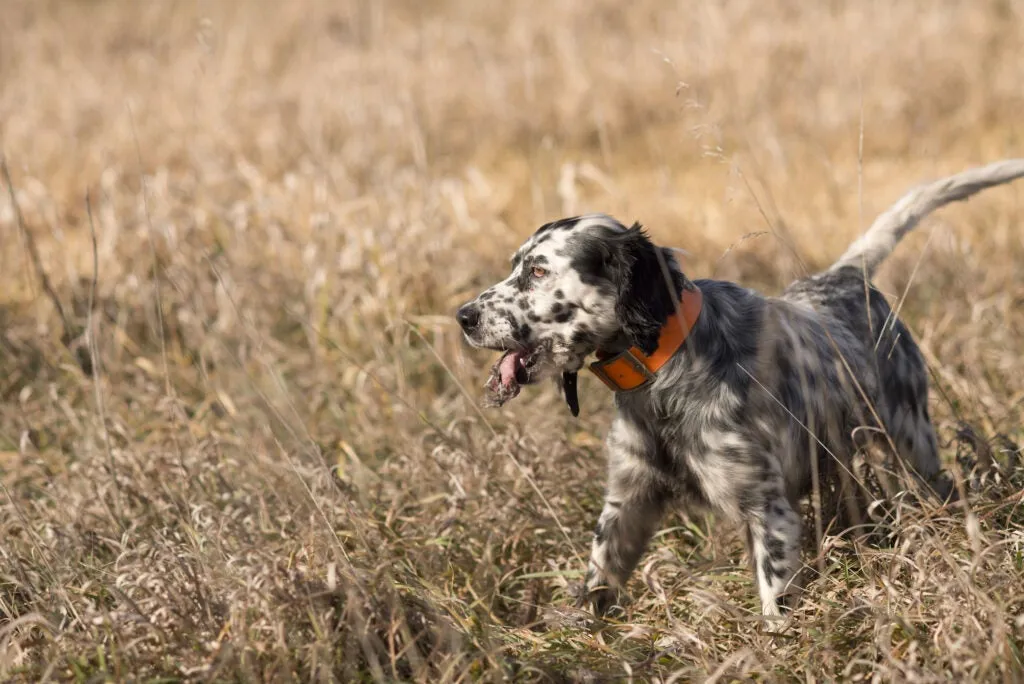 Brittany searches for birds on an upland bird hunt.
Brittany searches for birds on an upland bird hunt.
An English Setter retrieves a bird during an upland hunt, showcasing their skill even with a mouthful of feathers.
The English Setter is a breed that has been extensively depicted in literature and art, evoking a sense of tradition. This breed is diverse, varying in size, coat, and hunting style. Some run swiftly, while others trot. Some point with flair, others less so. Trainability also varies significantly.
Those who hunt with setters need patience. However, when a setter excels in running, hunting, and pointing, the experience is unforgettable, making the effort worthwhile.
4. American Foxhound
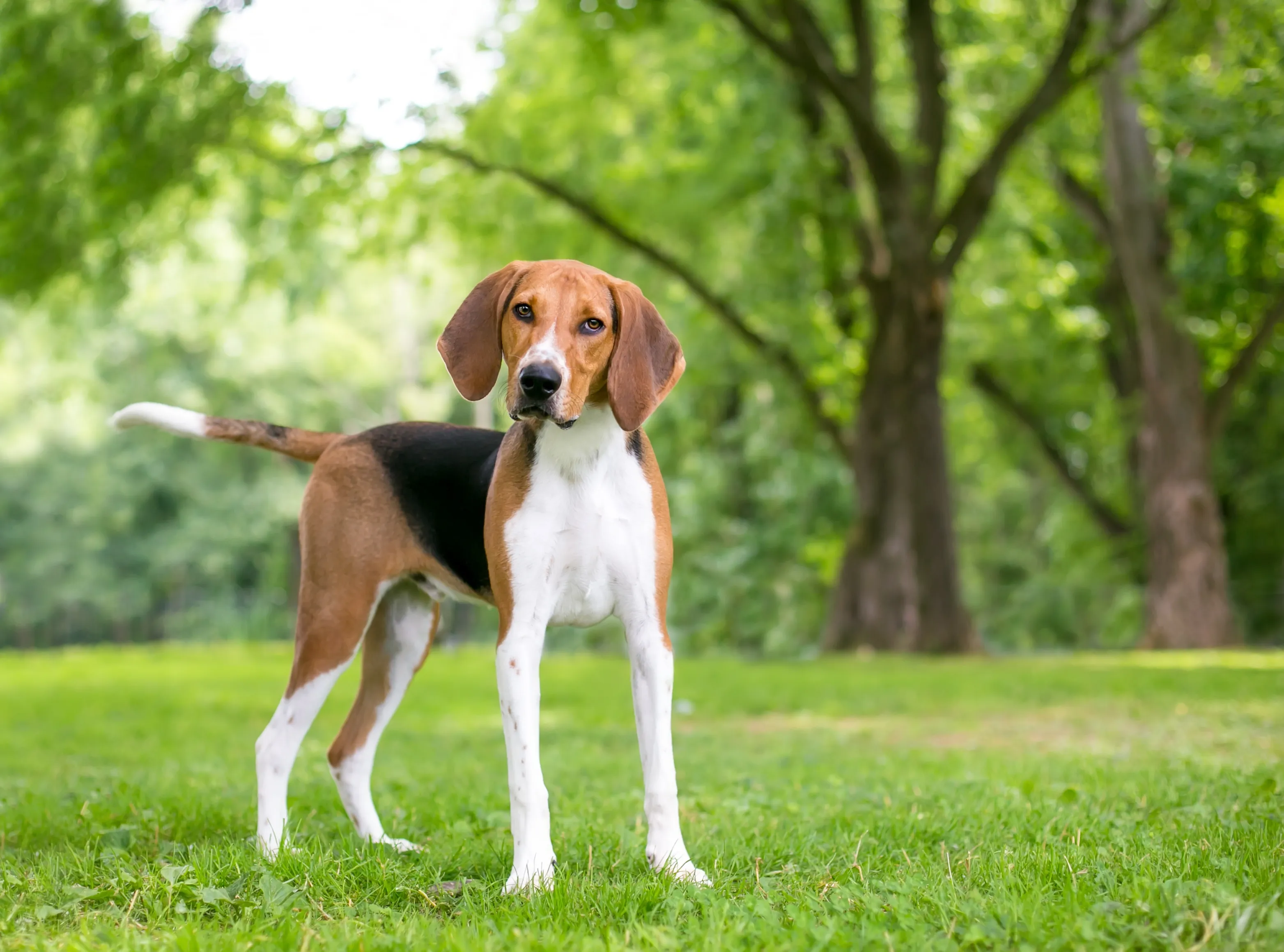 An American fox hound stands on a lawn with woods in the background.
An American fox hound stands on a lawn with woods in the background.
An American Foxhound stands in a yard, displaying the breed’s typical build and alert demeanor.
The American Foxhound, developed from French, English, and Irish foxhounds, resembles a long-legged Beagle. These large dogs are known for their gentle temperament. They hunt by scent and are relentless, capable of running for hours. Their distinctive howl has a bell-like quality, setting them apart from other hounds. Their courage is notable; they will continue hunting even with injuries.
5. Treeing Walker
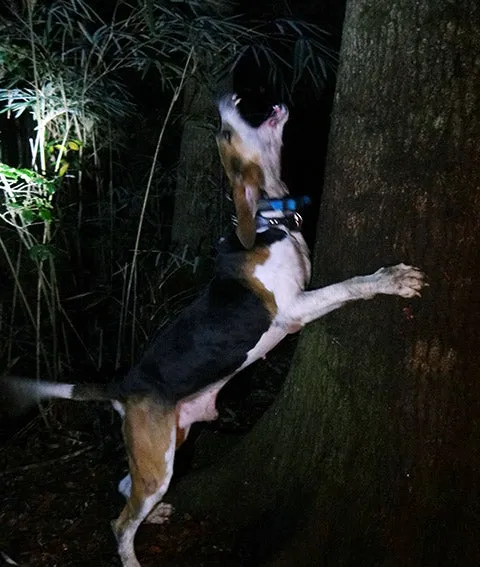 A treeing-walker-hound barks at a treed raccoon at night.
A treeing-walker-hound barks at a treed raccoon at night.
A Treeing Walker Coonhound barking enthusiastically at a raccoon up in a tree during a nighttime hunt.
Treeing Walkers are quick starters and competitive hounds. They are energetic and may pursue various animals. Training with live raccoons helps them develop a focused hunting style. They use a distinctive bark to signal when they have located their prey.
6. Beagle
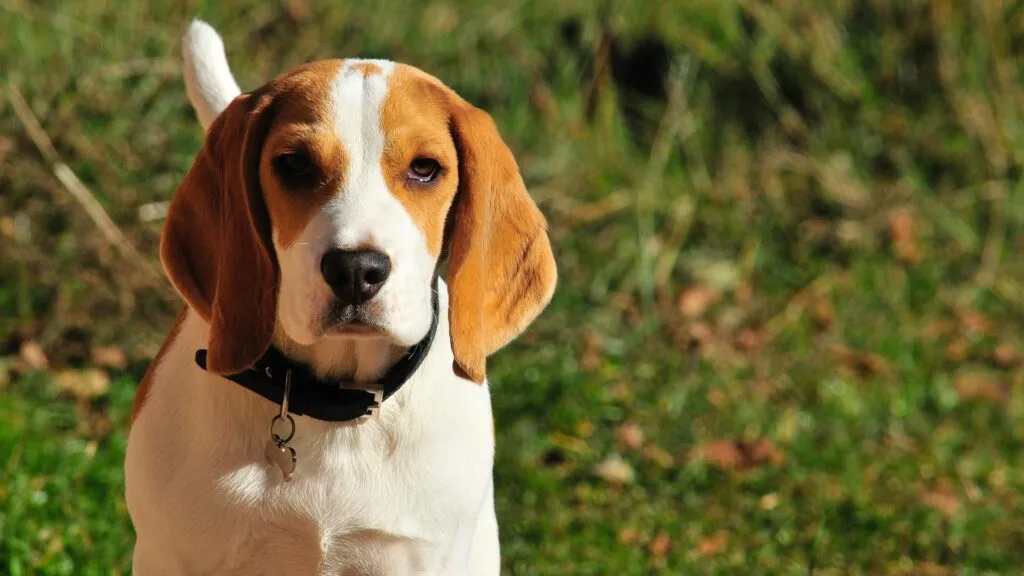 beagles are great dogs for hunting small game.
beagles are great dogs for hunting small game.
A Beagle, ideal for hunting small game, is shown here on a hunt.
Beagles excel at rabbit hunting, whether in packs or alone. Their hunting instinct is strong. They are known for their excellent sense of smell and trail toughness. Beagles are also cheerful and happy dogs, making them great companions.
7. German Wirehaired Pointer
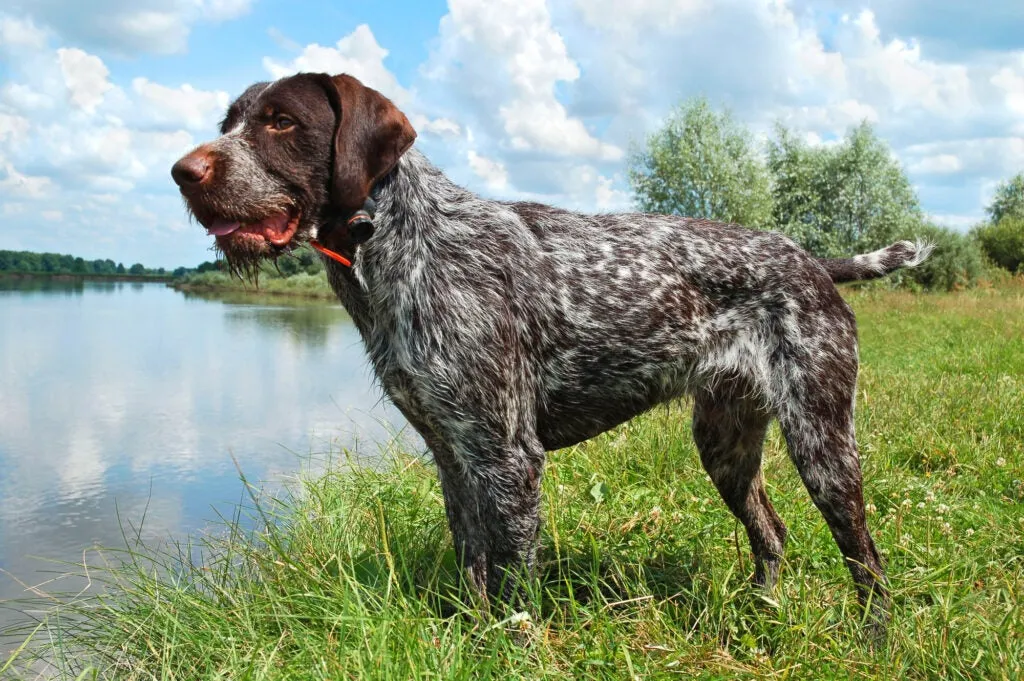 German Wirehaired Pointer, one of the best hunting dog breeds, pauses on a bird hunt
German Wirehaired Pointer, one of the best hunting dog breeds, pauses on a bird hunt
A German Wirehaired Pointer pausing during a bird hunt.
The German Wirehaired Pointer is a versatile gun dog, adept at tracking and retrieving game in challenging conditions. Bred in Germany in the 1880s, they are known for their bristly coat, which provides insulation and protection. There are two types: the Deutsch Drahthaar, bred for versatility, and the Americanized German Wirehaired Pointer. Both are excellent retrievers and protectors.
8. Mountain Cur
Mountain Curs are versatile dogs that were essential to early pioneers. They could herd livestock, face bears, and tree squirrels. A revival of cur breeding has led to recognized lines, including the original Mountain Cur.
9. Boykin Spaniel
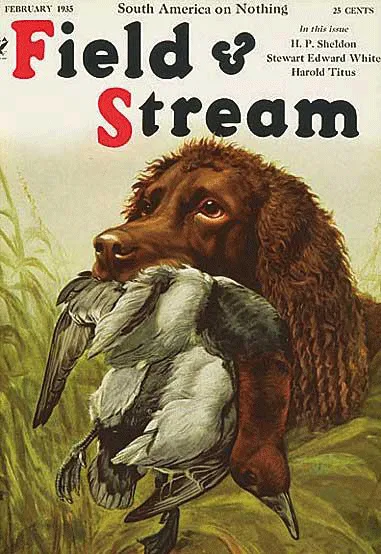 Boykin spaniel on vintage Field & Stream cover
Boykin spaniel on vintage Field & Stream cover
A vintage Field & Stream cover featuring a Boykin Spaniel.
Boykin Spaniels are versatile hunting dogs that originated in South Carolina. They are effective in swamps, duck blinds, and quail fields. They are known for their retrieving abilities and make good family dogs. However, they may not be suitable for cold, open-water duck hunts.
10. Golden Retriever
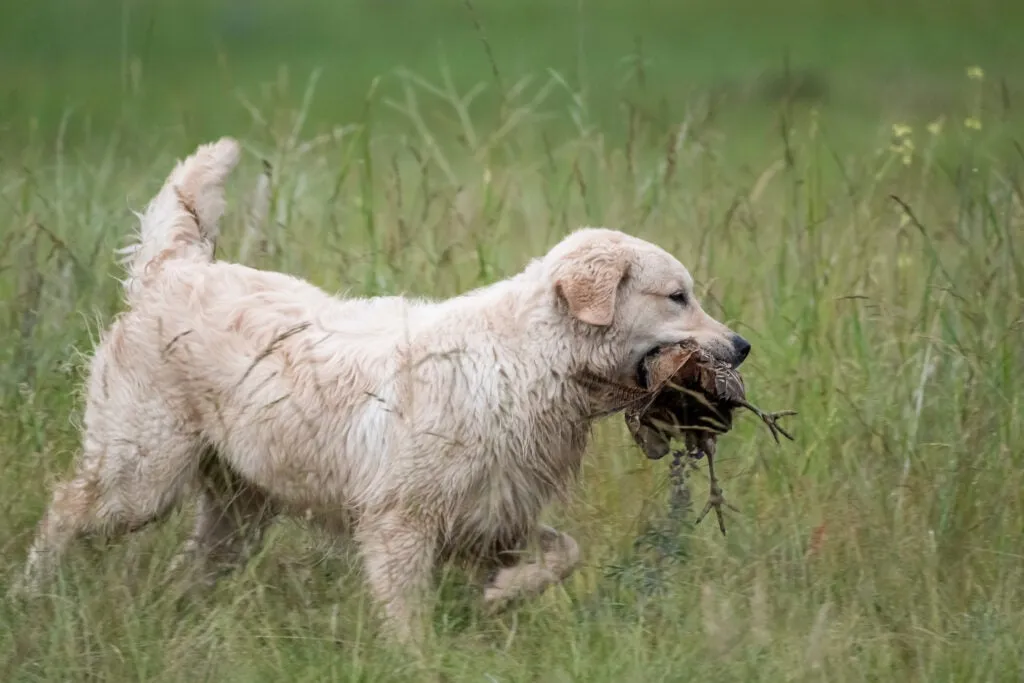 Golden retriever, one of the best hunting dog breeds, retrieves a bird on a hunt.
Golden retriever, one of the best hunting dog breeds, retrieves a bird on a hunt.
A Golden Retriever retrieving a bird during a hunt, showcasing its ability in the field.
Golden Retrievers are athletic, all-purpose hunters, effective in both marshes and uplands. They are affectionate and eager to please, with a tenacious spirit. They excel at upland game, particularly pheasants, and are also capable waterfowl dogs.
11. Irish Setter
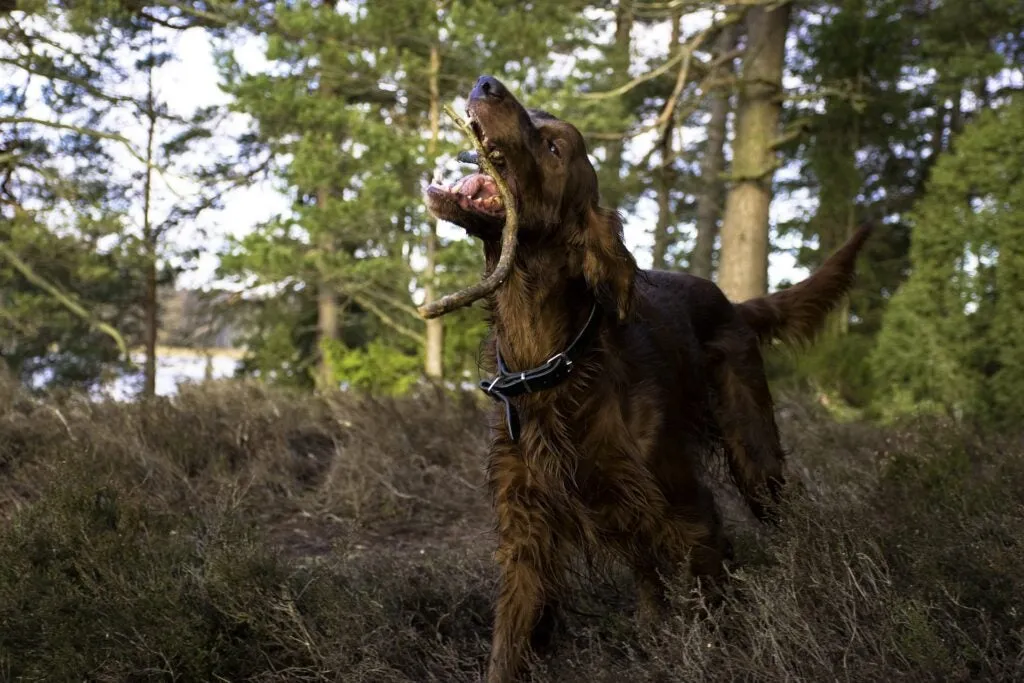 Irish setter, one of the best hunting dog breeds, fetches a stick
Irish setter, one of the best hunting dog breeds, fetches a stick
An Irish Setter fetching a stick.
Irish Setters are known for their beauty and hunting ability. Today’s hunting Irish Setters are athletic, stylish, and tough, making them excellent bird finders and all-purpose hunters.
12. Bluetick Hound
Bluetick Hounds are known for their exceptional noses and are effective at treeing various animals. They are free-tonguers, often howling while on the trail. They are energetic and need to burn off steam, making them suitable for active owners.
13. English Pointer
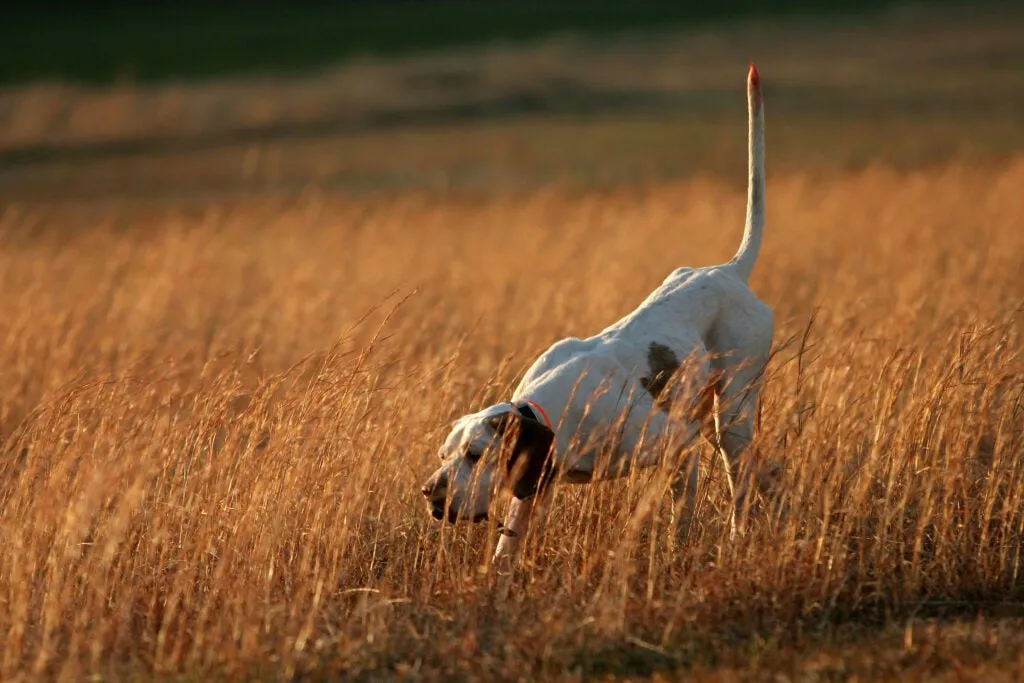 Pointer, English springer spaniel, one of the best hunting dog breeds, finds a bird on an upland hunt.
Pointer, English springer spaniel, one of the best hunting dog breeds, finds a bird on an upland hunt.
A Pointer striking a pose during a hunt.
English Pointers are high-performance dogs known for their intensity. They are best suited for experienced trainers and excel in big country. They cover ground quickly and strike a point with impressive energy. However, they are susceptible to cold.
14. English Springer Spaniel
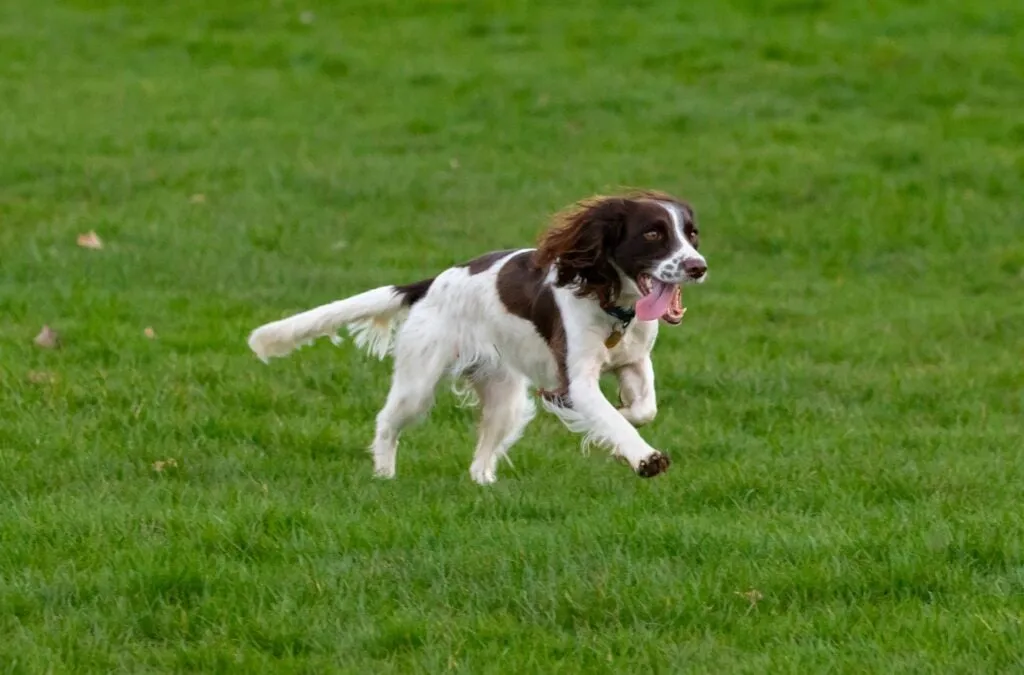 English springer spaniel, one of the best hunting dog breeds, trains in a field.
English springer spaniel, one of the best hunting dog breeds, trains in a field.
An English Springer Spaniel training in a field, showcasing their energetic and focused nature.
English Springer Spaniels are energetic flushers, excelling at hunting pheasant. They also retrieve ducks effectively and are known for their excellent noses. They make wonderful house dogs.
15. Chesapeake Bay Retriever
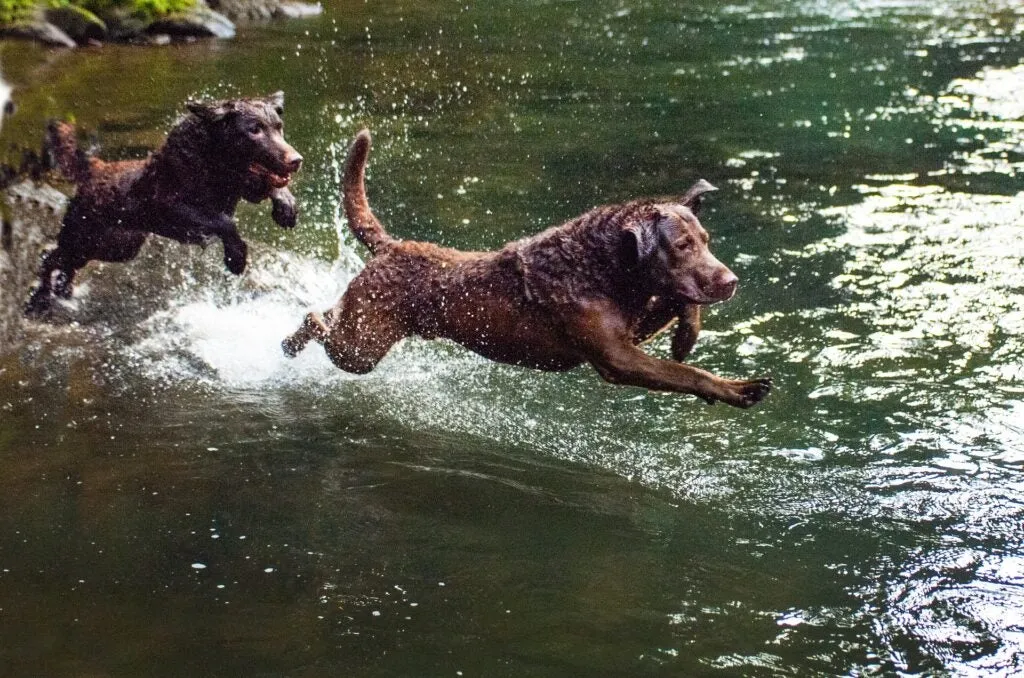 Chesapeake bay retrievers, one of the best hunting dog breeds, jumping in the water
Chesapeake bay retrievers, one of the best hunting dog breeds, jumping in the water
Chesapeake Bay Retrievers jumping into water, highlighting their love for the water and their strong build.
Chesapeake Bay Retrievers are intelligent and loyal dogs, devoted to their owners. They are athletic and love the outdoors, particularly the water. They are determined and excel at waterfowl hunting in tough conditions. Training is essential for this breed.
16. American Pit Bull
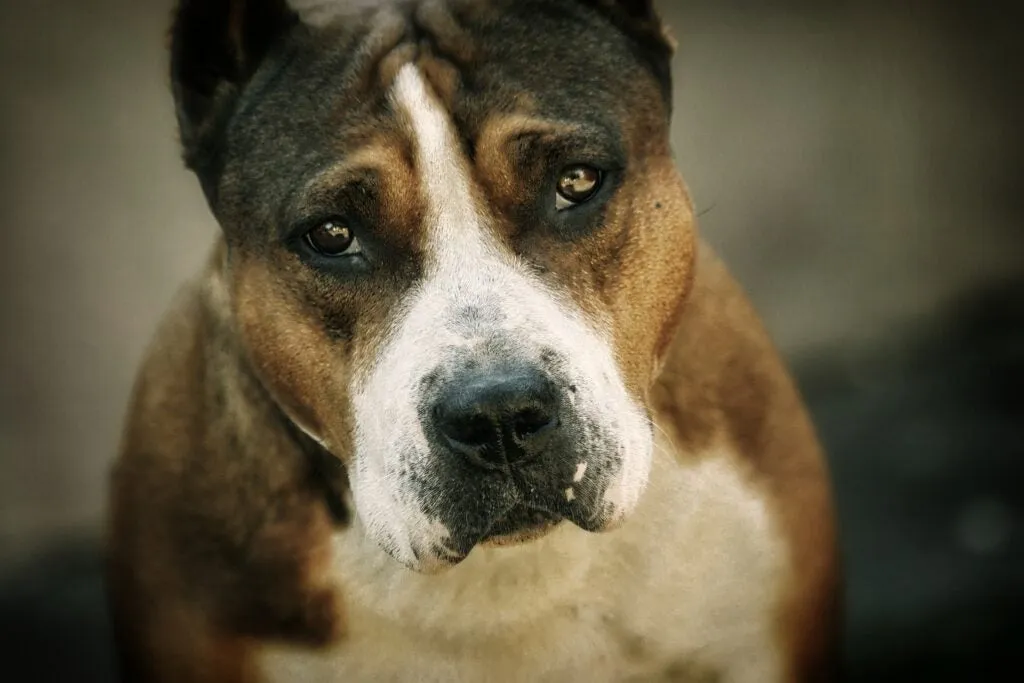 American pitbull, one of the best hunting dog breeds, shows her sweet side
American pitbull, one of the best hunting dog breeds, shows her sweet side
An American Pit Bull with a gentle expression.
American Pit Bulls are fierce fighters but also gentle family companions. They are now used for hog hunting, where they excel at manhandling feral hogs.
17. Cocker Spaniel
Cocker Spaniels are energetic flushing dogs, ideal for grouse and woodcock hunting. They also perform well in pheasant and light-duty waterfowling. They are functional game-getters and exciting to hunt with.
18. German Shorthaired Pointer
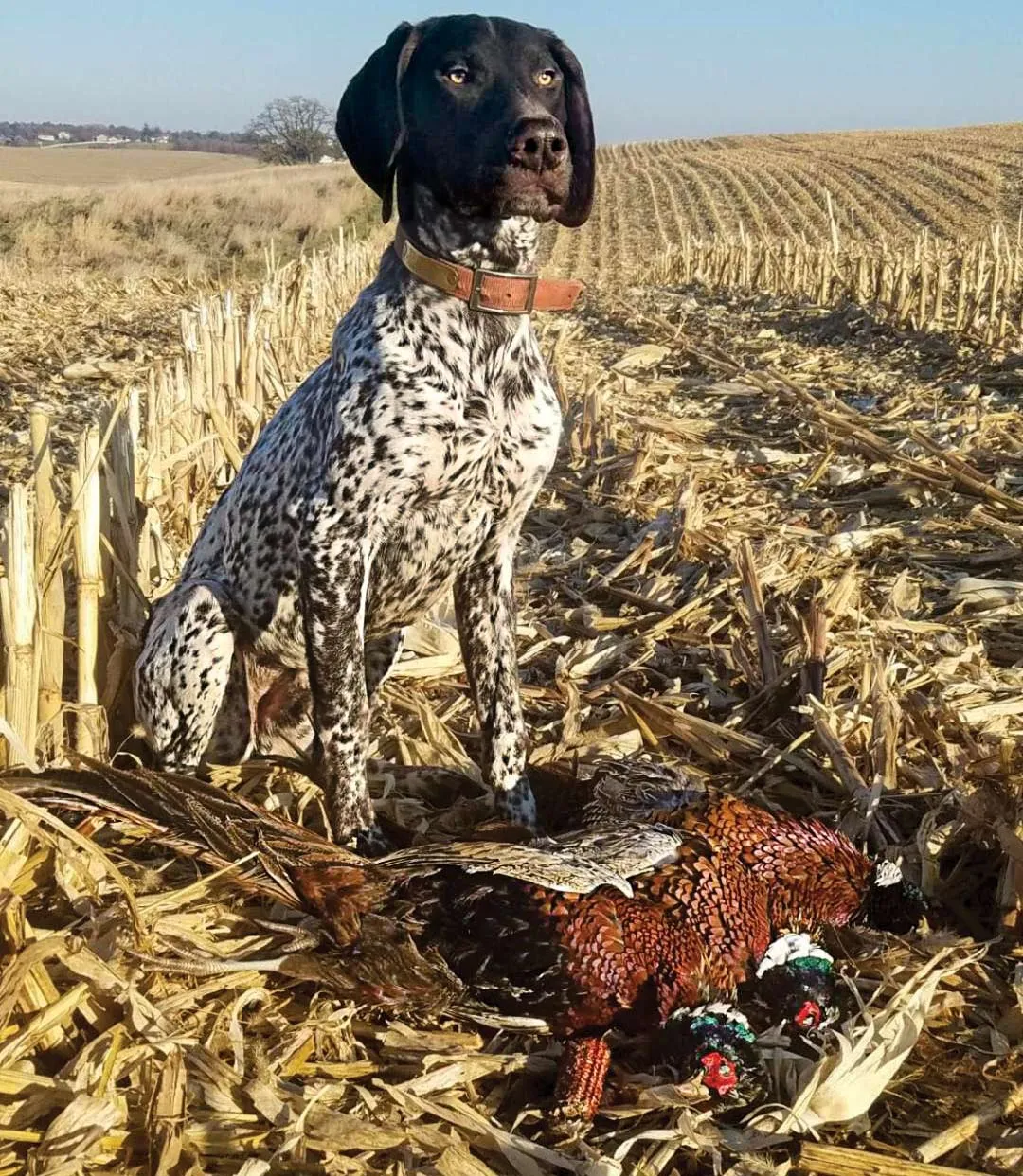 Hunting Dogs photo
Hunting Dogs photo
A German Shorthaired Pointer (GSP) proudly posing after a successful pheasant hunt.
German Shorthaired Pointers are versatile bird dogs, used throughout the United States. They are biddable, easy to train, and excellent retrievers. They work well within range of hunters on foot and are suitable for various terrains.
19. Redbone Hound
Redbone Hounds are bred to run and tree game, opening on a track and quickly locating their prey. They train easily and are wonderful companion dogs. They enjoy both hunting and spending time with their owners.
20. Jack Russell Terrier
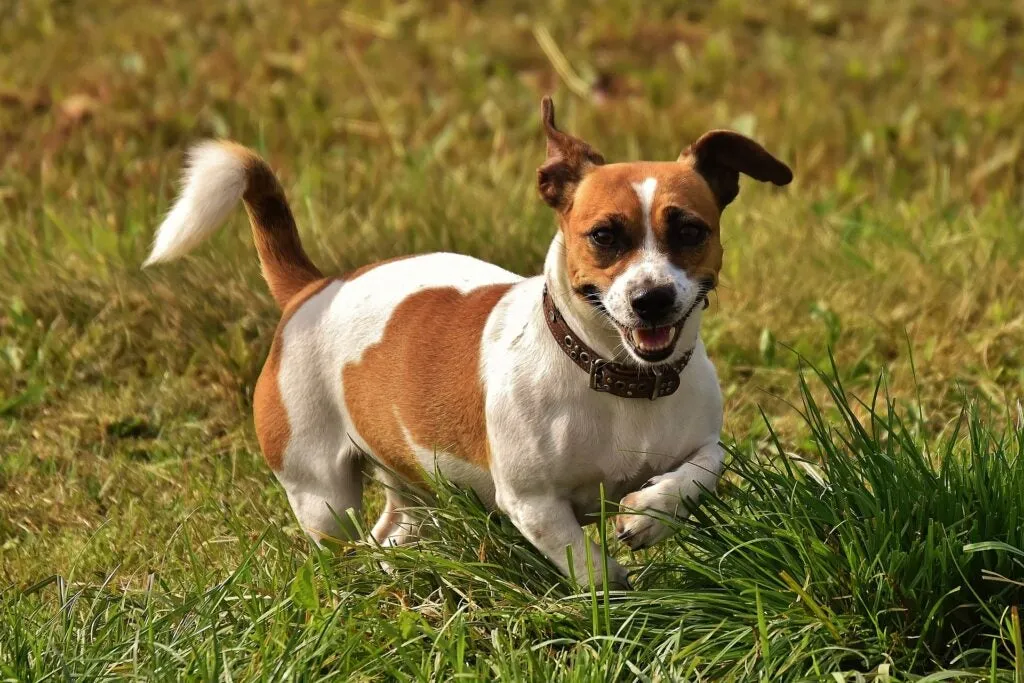 Jack russell terrier, one of the best hunting dog breeds, runs in a field
Jack russell terrier, one of the best hunting dog breeds, runs in a field
A Jack Russell Terrier running.
Jack Russell Terriers are versatile working dogs used for pest control and blood-trailing. They are known for their tenacity and sweet nature.
21. Plott Hound
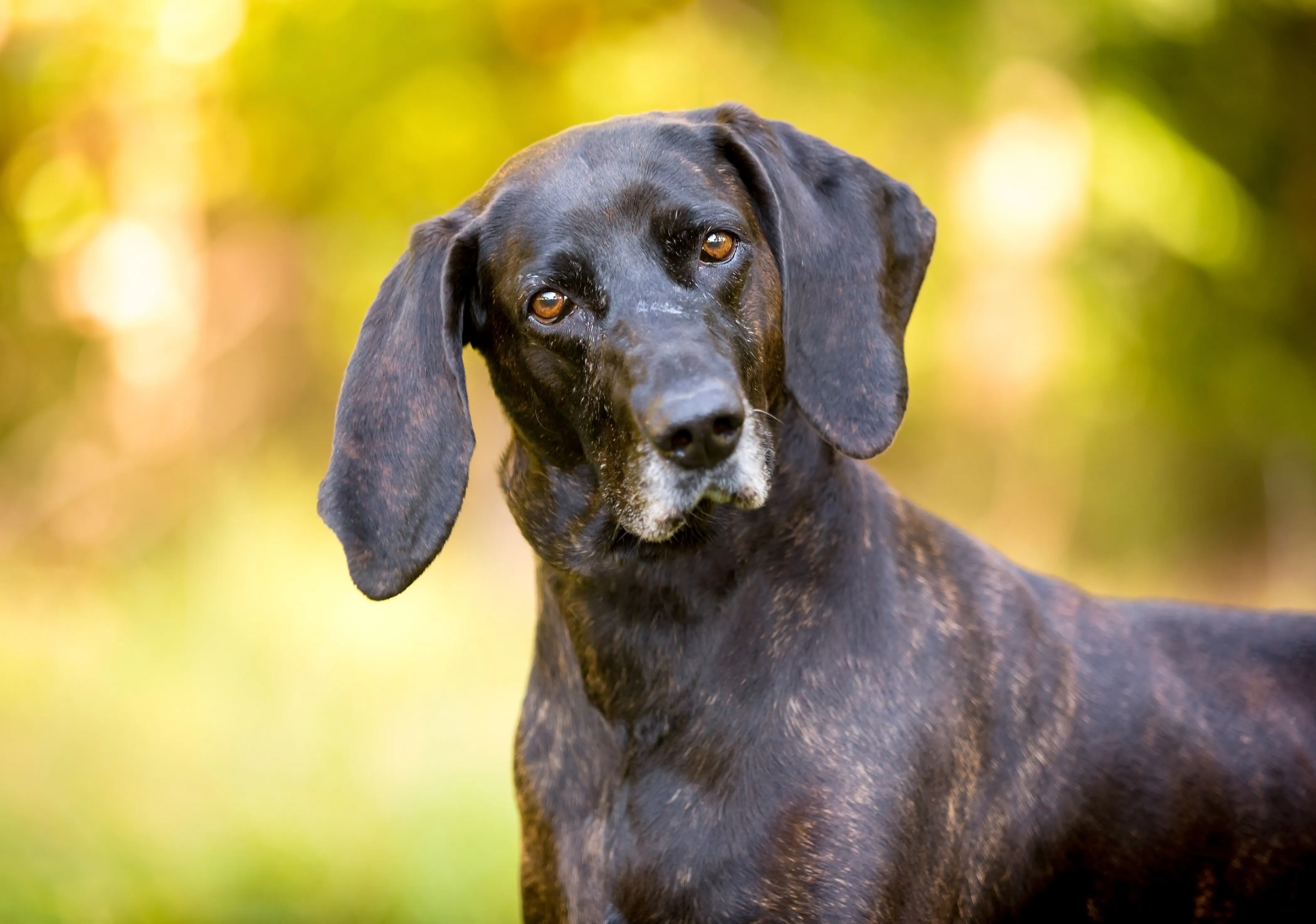 A Plott hound looks at the camera with sunny woods in the background.
A Plott hound looks at the camera with sunny woods in the background.
A Plott Hound with sunny woods in the background, known for their ability to sort out complicated scent trails.
Plott Hounds are athletic hounds known for their ability to sort out complicated scent trails over challenging terrain. They are often used for hunting bears and boars.
3 Bonus Breeds: The Unusual Suspects
Here are a few hunting dog breeds that stand out in the field but are often overlooked.
Small Munsterlander
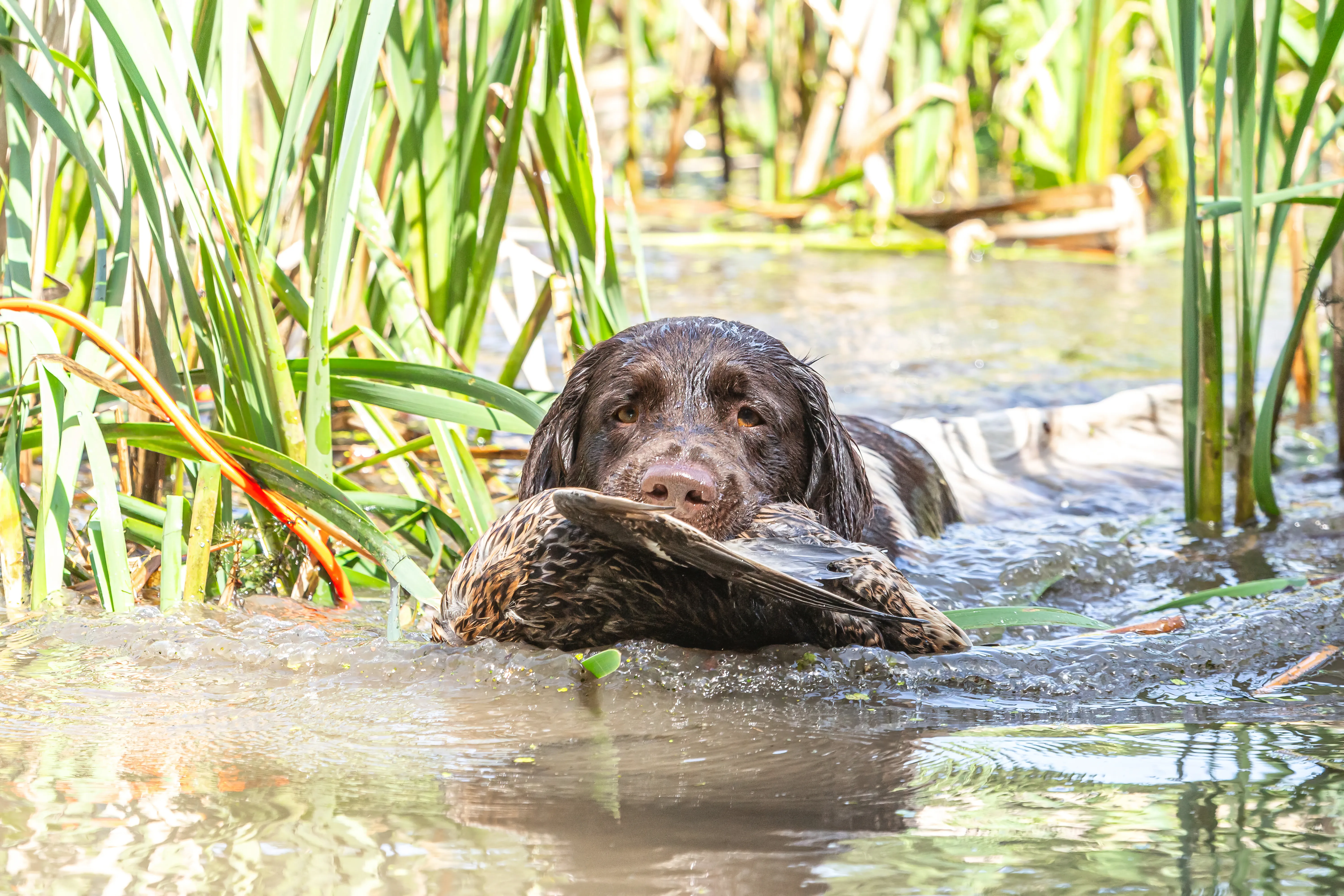 A small Munsterlander retrieves a duck.
A small Munsterlander retrieves a duck.
A Small Munsterlander retrieving a duck, illustrating their versatility as hunting dogs.
Small Munsterlanders are versatile dogs developed for hunters who depended on selling game. They are biddable, easy to train, and make great family pets.
Hunting Doodles
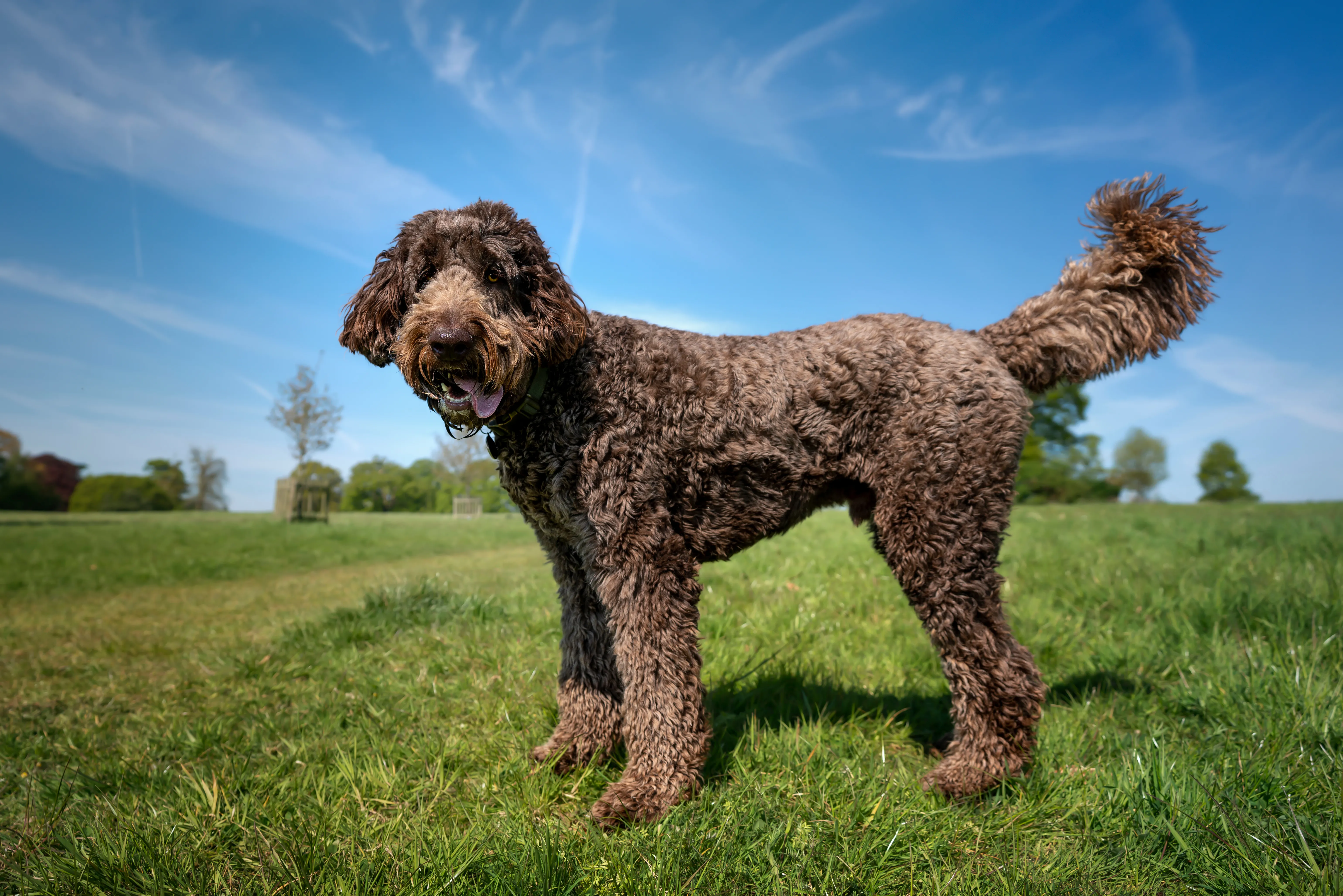 A labradoodle stands in a field.
A labradoodle stands in a field.
A labradoodle in a field, showing that labradoodles and golden doodles can be effective hunting dogs.
Labradoodles and Golden Doodles can be effective hunting dogs if bred for the field. They originated as guide dogs for people with allergies and have since been developed into hunting strains.
Dachshund
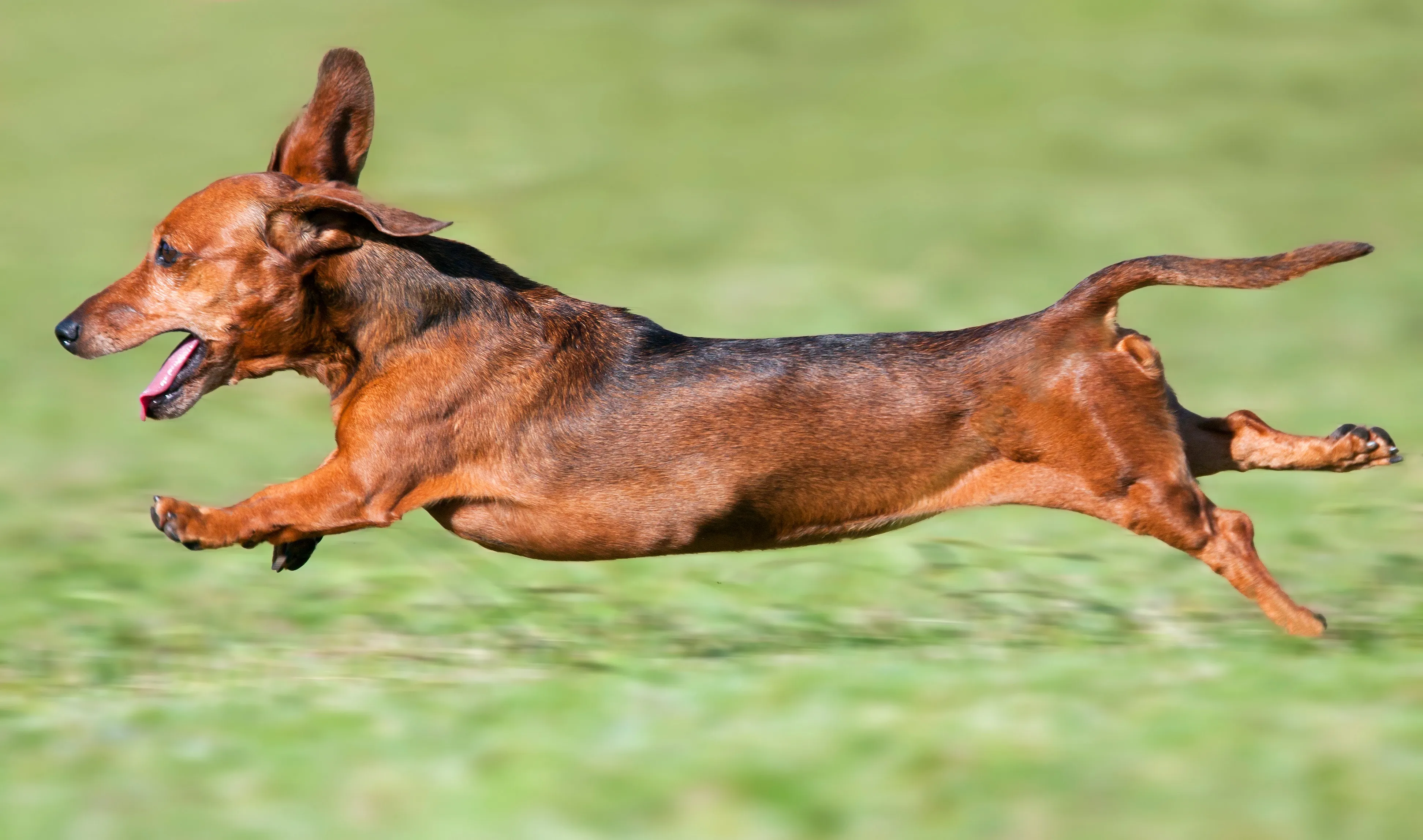 A dachshund races across a field.
A dachshund races across a field.
A Dachshund racing across a field.
Dachshunds, known as “badger hounds,” are fierce and determined hunters. They excel at hunting furred game and blood-trailing deer.
